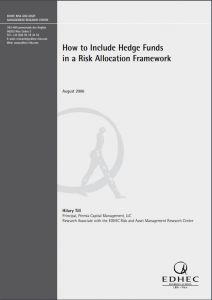

How to Include Hedge Funds in a Risk Allocation Framework
This article, which was originally written as a two-part series, discusses the innovative ways in which academics and practitioners are enhancing asset allocation methodologies in order to incorporate hedge funds. It begins by discussing the current practice in asset allocation work and goes on to describe the unique problems that occur when this methodology is applied to hedge funds. It also discusses a number of leading edge solutions to these problems. Included are anecdotes from anonymous hedge fund managers and traders, which illustrate some of the academic points made in the article. A revisited version of this paper was published in the GARP Risk Review µ, the Journal of the Global Association of Risk Professionals, September/October and November/December 2002 issues.
Author(s):
Summary:
This article, which was originally written as a two-part series, discusses the innovative ways in which academics and practitioners are enhancing asset allocation methodologies in order to incorporate hedge funds. It begins by discussing the current practice in asset allocation work and goes on to describe the unique problems that occur when this methodology is applied to hedge funds. It also discusses a number of leading edge solutions to these problems. Included are anecdotes from anonymous hedge fund managers and traders, which illustrate some of the academic points made in the article. A revisited version of this paper was published in the GARP Risk Review µ, the Journal of the Global Association of Risk Professionals, September/October and November/December 2002 issues.
Register to download PDF
Register/Log in| Type : | Working paper |
|---|---|
| Date : | 04/08/2006 |
| Keywords : |
Alternative Investments |

